respiratory support

free shipping over $100 (USA & Canada)
1-877-937-4372 the pet expert hotline


So you just adopted a dog?! Congratulations! This is a really exciting time. And a big transition for everyone/pup involved. You probably have a lot of questions (and more than a few concerns too). Trust us when we say, so does your new furkid!
And since your dog is not a mind reader, you guys will need to create this new dialogue together.
It’s gonna take a while for you guys to get to know each other. Like human babies, your pup wasn’t born with a vocabulary. The way we see it is that the best way to get to know each other (and establish a long-lasting bond) is to develop a language that both your pup and your family can understand. Just as in any other relationship, communication is the key to success! And since your dog is not a mind reader, you guys will need to create this new dialogue together.
The easiest and most sure-fire way to do this is by hiring a professional dog trainer to facilitate the transition and teach the whole family how to communicate. You might think a trainer just educates your pup on right from wrong, but in fact, trainers are super helpful in establishing a language for everyone to employ. Remember, you guys are in this together.
But how do you go about finding a dog trainer? And how do you make sure you have found the right one? These are great questions! So we outlined some ways for you to find a trainer that’s perfect for your pup and your family.
The easiest place to start is by asking around. Do you have friends or family with dogs? If not, you could try going to your local dog park and make some new dog-family friends. Watch how the parents interact with their dog and ask yourself; do you think their dogs are “good dogs”? Do they look bonded with their humans? Are the parents and pups communicating well with each other? If you answered yes to any of these questions, then go ahead and ask them who they used! When choosing a professional (be it a dentist, hairstylist, or chiropractor), nothing feels as safe as having someone recommend “their person.”
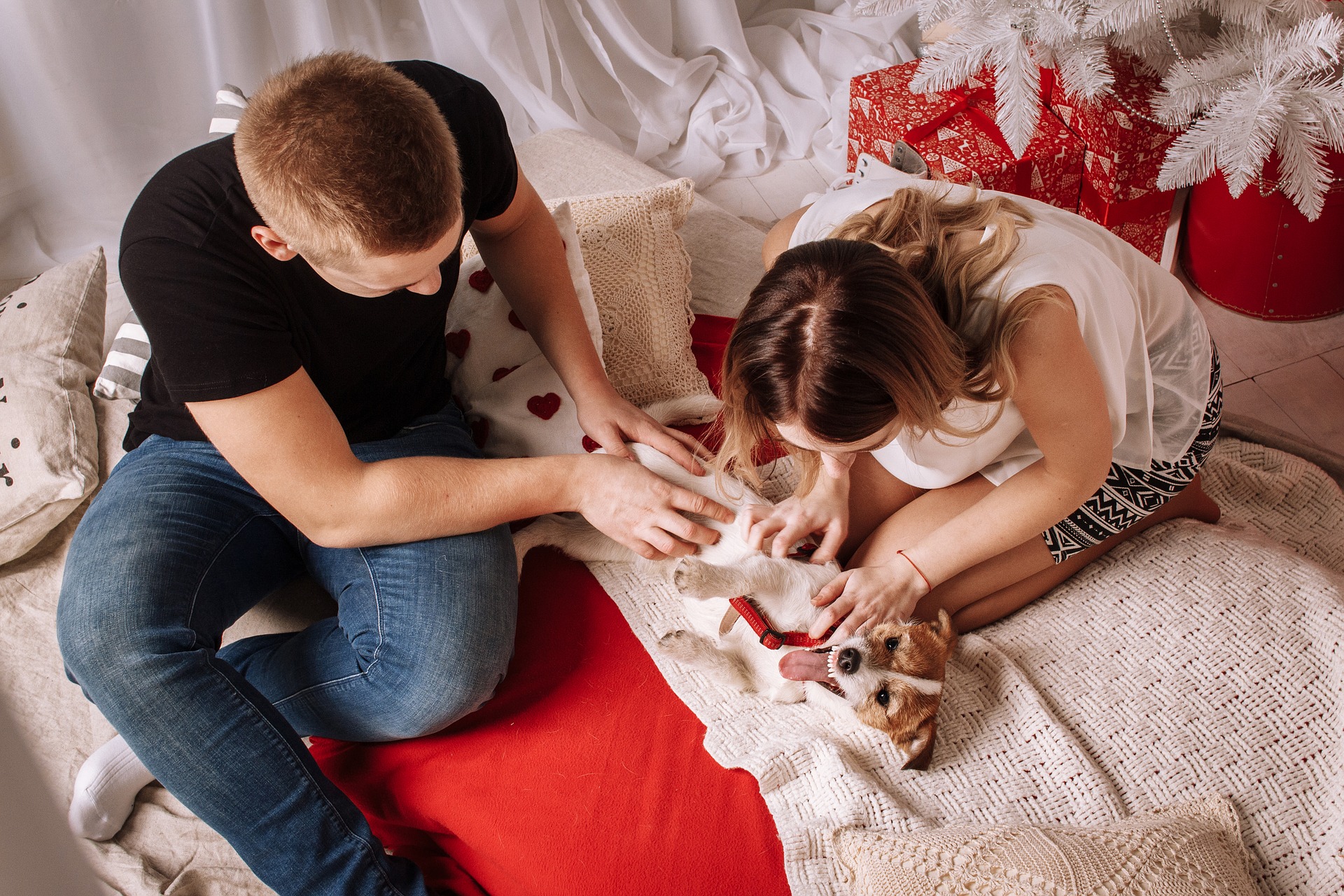
If you’re not fortunate enough to know or befriend any dog families, then Google is a great tool to begin your search. Start by looking up everything you can about the trainers in your neighborhood. Read about their methods and take note of their educational backgrounds. Look at how long they have been in business, what formal training they have had, and if any programs/institutions have accredited them. Just remember, when using Google it is important to approach the information with a critical eye. You can’t trust ALL online reviews, snazzy websites, or testimonies. But it’s a great place to start to help you narrow down your choices.
There are SO many different types of training methods and tools out there! Trainers can implement lure-reward methods with treats or positive reinforcement techniques like clicker training (to name a few). They can call themselves trainers, behavior consultants, behaviorists, or dog psychologists. They can use slip collars, e-collars, crates, or harnesses as aids. In order to determine what kind of trainers/methodologies might work for you, it’s important to understand what all these different terms and approaches mean. We suggest checking out The Association of Professional Dog Trainers website to learn more about the various tools and different areas of focus.
Once you have a grasp of what the terms mean and have identified a few trainers in your neighborhood, the next step would be to schedule a visit and watch them in action! A confident, professional trainer should be more than happy to have you sit in on one of their classes (we would be wary of anyone who refuses that courtesy). Take note of how they interact with both the humans and the dogs. Do they look engaged? Enthusiastic? Supportive? Or are they being combative or disparaging?
By watching the trainer you will not only get a better understanding of their practices but also get a better sense of their character and temperament. The trainer’s personality should mesh with yours; remember you are entrusting them with your new kid (so you guys will want to be simpatico).
Visiting the trainer will also give you a good sense of their facilities. Presumably, you will want the safest, cleanest environment for your dog to learn. When conditions are not up to par infection and disease, like Kennel Cough, can spread easily. There are simple remedies for such afflictions, like NHV Natural Pet Product’s vet-approved Kennel Cough Kit, but in general, it would be best to avoid these conditions altogether. So take a look around and make sure the place is clean, has safety precautions like gated doors intact, and that the environment is welcoming for you and your dog.
These days, it’s very easy for anyone to call themselves a “trainer.” There is no definitive regulation on what constitutes a professional dog trainer (anyone can just slap the title on their resume). So don’t be shy! Trainers work for you and your dog, and the great ones don’t come cheap, so you better make sure you’re getting the best bang for your buck. It is essential to ask each trainer about their credentials (and for you to know what each one of them means). Here is a shortlist of helpful acronyms to look for (you’ll definitely want your trainer to have one of these in their title):
1. CTC: means they have completed an advanced, two-year program from the Academy for Dog Trainers, which covers both dog training and behavior.
2. KPA CTP: means the trainer has taken the Karen Pryor Academy Dog Trainer Professional program (which according to Companion Animal Psychology is one of the most advanced, rigorous programs)
3. CPDT-KA, CPDT-KSA, or CBCC-KA: means the trainer has been certified by the Certification Council for Pet Dog Trainers and can use the title “Certified Pet Dog Trainer, Knowledge-Assessed”.
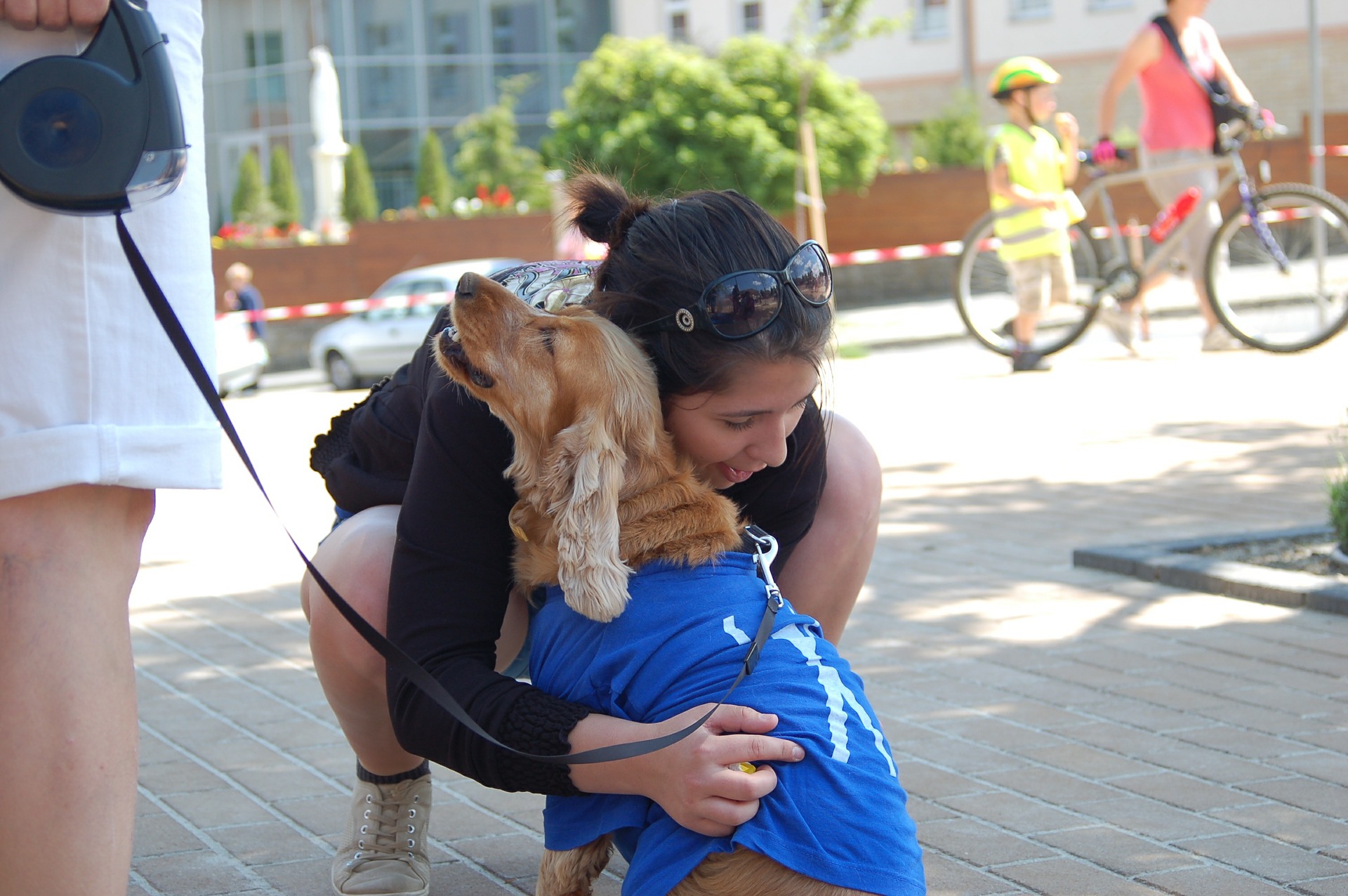
These clues won’t answer all of your questions, but they are valuable in determining which trainer is the most proficient and professional. If you’re still struggling at the end of your research, we would also suggest contacting your local veterinarian. They might be able to offer new insight or at least provide additional questions you can pose to the trainer.
The steps outlined above are meant to inform and guide your thinking, but the truth is there is nothing as valuable as trusting your gut. But while you are searching for your doggy facilitator, here are also a few other ways you could help ease the transition:
1. Make sure to create an inviting, cozy space for your new pup. It’s always advisable to establish boundaries as soon as possible. If you don’t think you will want your furkid hanging on the couch, then be sure to have a comfy bed available in a pre-defined space so they know exactly where their place is in the house.
2. Just like human babies, young dogs crave stimulation. Don’t underestimate the value of some good (sturdy) toys! Not only will this help to keep your dog engaged, but they can afford you some R&R when you just can’t throw a tennis ball any longer…
3. It stands to reason that your new pup might be skittish when they arrive in their new home, so try researching some safe, natural methods that could help calm them down while they explore their new environment. Trying something like NHV Natural Pet Products’ LessStress For Dogs, a formula geared towards reducing anxiety, could be a great option for calming your new dog’s nerves.
4. As we have said before, there is no drawback to asking a professional (and there is no such thing as a stupid question!). So try reaching out to a forum, a meetup group, or the APDT to help you narrow down your choices (because real professionals always know best!).
Julie Feldman is a born and raised New Yorker who has raised many of her own New York fur-kids. She is currently a proud mother to her rescue cat O.C, and a doting aunt to her nieces Uma, the German Shepherd, and Ren, the Welsh Terrier. Julie is a firm believer that New York City is best experienced with a dog (or outdoor cat) as your co-pilot.
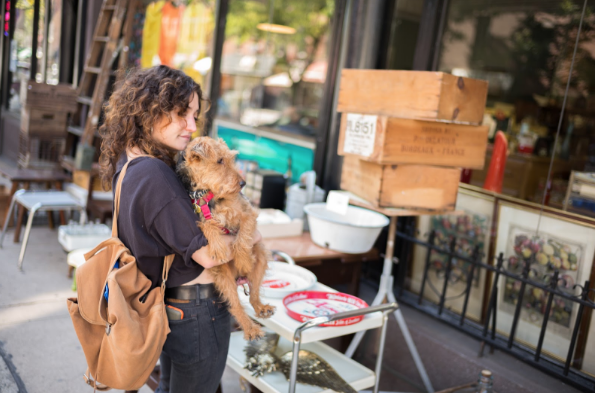
Feel free to reach out to one of our Pet Experts if you have any questions regarding your pet’s health!
respiratory support

Resp-Aid & Stimmune
bundle and save with pet expert kits
3 month supply for a small to medium size pet
The NHV Kennel Cough Kit contains natural vet-approved dog kennel cough supplements designed to help prevent and manage the symptoms of Kennel Cough. These herbal remedies not only support coughs and respiratory issues, they also balance the immune system.


The NHV Kennel Cough Kit contains natural vet-approved dog kennel cough supplements designed to help prevent and manage the symptoms of Kennel Cough. These herbal remedies not only support coughs and respiratory issues, they also balance the immune system.

Kennel cough, is predominately found in dogs and is a respiratory infection caused by Bordetella bronchiseptica, adenovirus and canine parainfluenza virus. These pathogens attack the cilia lining of the respiratory tract causing inflammation of the upper airway, resulting in a cough. This irritation makes your dog susceptible to secondary infection. Kennel cough is extremely contagious. In some cases, the situation may be complicated by secondary bacterial pneumonia. Extra care is required to prevent pneumonia and improve breathing.
When a dog has kennel cough or has been in contact with an infected animal it is just as important to support their immune system as it is to address the symptoms of the cough itself.
NHV Resp-aid is a dog kennel cough supplement that helps to sooth the upper respiratory tract, reduce inflammation, fight infection and ease congestion.
NHV Stimmune combined with the NHV Resp-aid offers the most benefit and support. This herbal formula is a very effective immune booster. Packed full of herbs that have antibiotic and antiviral properties, Stimmune not only boosts the immune system, but also helps to fight and prevent secondary infections that are commonly associated with kennel cough.
RESP-AID
Coltsfoot - Helps control coughing, relaxes spasms and soothes irritated tissue; is an expectorant and has antibacterial properties.
Marshmallow – An anti-inflammatory that controls bacterial infections and soothes and softens irritated tissues.
Plantain – An expectorant that soothes and lubricates internal mucous membranes.
Mullein – Soothes and lubricates tissues.
Horehound – Relieves spasms.
Licorice – A versatile herb that is a fast-acting anti-inflammatory agent ideal for the treatment of respiratory illnesses.
Lobelia – Relaxes and expands the respiratory system to allow oxygenated blood to flow freely.
Ginger – Relieves discomfort and stimulates circulation.
Myrrh – A stimulant that relieves spasms, inflammation, and digestive discomfort.
__________________________________________________
STIMMUNE
Astragalus - Stimulates liver function and improves the immune system.
Echinacea Purpurea – Reduces inflammation and helps boost the immune system and efficiently fight infection.
Oregon Grape – Has antibiotic and immunostimulatory properties.
Asian Ginseng – Improves appetite and increases organic resistance to diseases.
Myrrh – An astringent that relieves irritated skin.
Select your pet's weight to determine the correct dose.
To be taken twice daily. Determine your pet’s weight and then use the easy chart below to determine the correct dose. This is the minimum dosage.
Pet's Weight Dosage
0 - 15 lb = 0.5 ml
16 - 30 lb = 1.0 ml
31 - 45 lb = 1.5 ml
46 - 60 lb = 2.0 ml
61 - 75 lb = 2.5 ml
Over 75 lb = 3.0 ml
For small animals (rabbits, ferrets), avians and reptiles use 1 drop for every 2 lb of body weight.
How to Administer
Shake well before use. The easiest method is to use the dropper provided and place the drops into your pet’s food or favorite treat. You can also use the dropper and squirt directly into the pet’s mouth. Some pets can be finicky, if this occurs consider hiding the drops in foods most pet’s love such as fish, chicken or yogurt or a favorite treat. If your pet only eats dry food then soak a few kibbles at feeding time.
For Best Results
Herbal dietary supplements are beneficial to the health and well-being of your pet and are safe for long-term use. Every pet responds to natural herbal supplements differently, therefore it is important to be consistent and administer the product daily. Supplements generally take two to four weeks to take effect, however this will vary from one animal to the next.
Product Storage
All NHV Natural Pet Products are pure herbal extracts and contain no artificial additives, preservatives or coloring. Shelf life after opening is 6 months and must be refrigerated after opening.
Cautions and Contraindications
Do not use in pregnant or nursing animals.
All information provided by NHV Natural Pet Products is for educational purposes only.
Kennel cough, is predominately found in dogs and is a respiratory infection caused by Bordetella bronchiseptica, adenovirus and canine parainfluenza virus. These pathogens attack the cilia lining of the respiratory tract causing inflammation of the upper airway, resulting in a cough. This irritation makes your dog susceptible to secondary infection. Kennel cough is extremely contagious. In some cases, the situation may be complicated by secondary bacterial pneumonia. Extra care is required to prevent pneumonia and improve breathing.
When a dog has kennel cough or has been in contact with an infected animal it is just as important to support their immune system as it is to address the symptoms of the cough itself.
NHV Resp-aid is a dog kennel cough supplement that helps to sooth the upper respiratory tract, reduce inflammation, fight infection and ease congestion.
NHV Stimmune combined with the NHV Resp-aid offers the most benefit and support. This herbal formula is a very effective immune booster. Packed full of herbs that have antibiotic and antiviral properties, Stimmune not only boosts the immune system, but also helps to fight and prevent secondary infections that are commonly associated with kennel cough.
RESP-AID
Coltsfoot - Helps control coughing, relaxes spasms and soothes irritated tissue; is an expectorant and has antibacterial properties.
Marshmallow – An anti-inflammatory that controls bacterial infections and soothes and softens irritated tissues.
Plantain – An expectorant that soothes and lubricates internal mucous membranes.
Mullein – Soothes and lubricates tissues.
Horehound – Relieves spasms.
Licorice – A versatile herb that is a fast-acting anti-inflammatory agent ideal for the treatment of respiratory illnesses.
Lobelia – Relaxes and expands the respiratory system to allow oxygenated blood to flow freely.
Ginger – Relieves discomfort and stimulates circulation.
Myrrh – A stimulant that relieves spasms, inflammation, and digestive discomfort.
__________________________________________________
STIMMUNE
Astragalus - Stimulates liver function and improves the immune system.
Echinacea Purpurea – Reduces inflammation and helps boost the immune system and efficiently fight infection.
Oregon Grape – Has antibiotic and immunostimulatory properties.
Asian Ginseng – Improves appetite and increases organic resistance to diseases.
Myrrh – An astringent that relieves irritated skin.
Select your pet's weight to determine the correct dose.
To be taken twice daily. Determine your pet’s weight and then use the easy chart below to determine the correct dose. This is the minimum dosage.
Pet's Weight Dosage
0 - 15 lb = 0.5 ml
16 - 30 lb = 1.0 ml
31 - 45 lb = 1.5 ml
46 - 60 lb = 2.0 ml
61 - 75 lb = 2.5 ml
Over 75 lb = 3.0 ml
For small animals (rabbits, ferrets), avians and reptiles use 1 drop for every 2 lb of body weight.
How to Administer
Shake well before use. The easiest method is to use the dropper provided and place the drops into your pet’s food or favorite treat. You can also use the dropper and squirt directly into the pet’s mouth. Some pets can be finicky, if this occurs consider hiding the drops in foods most pet’s love such as fish, chicken or yogurt or a favorite treat. If your pet only eats dry food then soak a few kibbles at feeding time.
For Best Results
Herbal dietary supplements are beneficial to the health and well-being of your pet and are safe for long-term use. Every pet responds to natural herbal supplements differently, therefore it is important to be consistent and administer the product daily. Supplements generally take two to four weeks to take effect, however this will vary from one animal to the next.
Product Storage
All NHV Natural Pet Products are pure herbal extracts and contain no artificial additives, preservatives or coloring. Shelf life after opening is 6 months and must be refrigerated after opening.
Cautions and Contraindications
Do not use in pregnant or nursing animals.
All information provided by NHV Natural Pet Products is for educational purposes only.
respiratory support
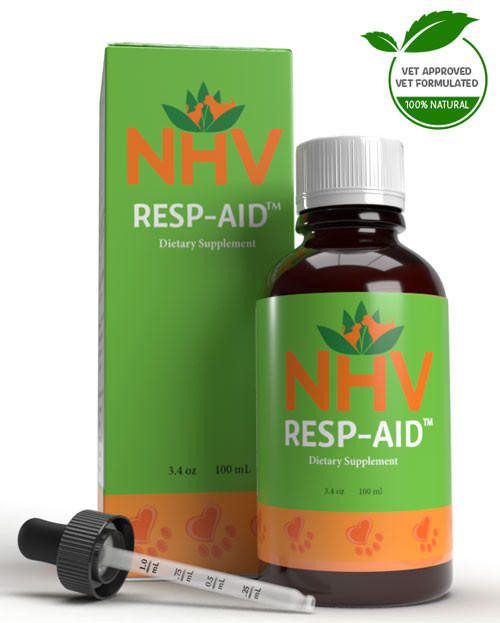
Vet-Formulated Remedy for Respiratory Infection in Dogs
buy 2 and save $3
3 month supply for a small to medium size
A 100% natural plant-based herbal remedy to help you dog fight infection and help relieve shortness of breath.
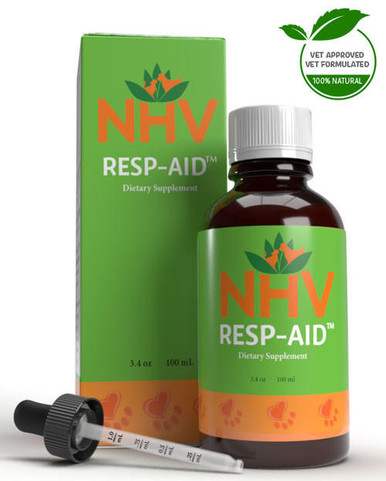
A 100% natural plant-based herbal remedy to help you dog fight infection and help relieve shortness of breath.
Dogs are susceptible to upper respiratory infections just like humans, and once infected, they can be highly contagious. Some breeds of dogs are more prone to getting respiratory infections, such as the Boston Terrier and Shih-Tzu. Find out if your dog breed is more prone to breathing difficulties and respiratory infections, and effective remedies for respiratory infection in dogs at NHV.
Symptoms of Respiratory Infections in Dogs
The symptoms are very similar to infection in humans.
Causes of Respiratory Infection in Dogs
Kennel cough is a common ailment among dogs that can be caused by a bacteria or viral infection.
NHV’s plant-based remedies can provide support along with vet-recommended treatment for respiratory infections in dogs. Read Bailee's tale of how NHV’s Resp-aid came to her rescue for allergic bronchitis.
You can read more about NHV Natural Pet Products and if you have questions about holistic supplements including our natural remedies for respiratory infections in dogs, ask an NHV expert, because, at NHV we want you and your canine companion to breathe easy naturally.
Your dog will breathe easier with NHV’s Resp-Aid, an all-natural plant-based formula containing these nine powerful herbs.
Beneficial Ingredients in NHV’s Natural Remedies for Respiratory Infections in Dogs
Select your pet's weight to determine the correct dose.
To be taken twice daily. Determine your pet’s weight and then use the easy chart below to determine the correct dose. This is the minimum dosage.
Pet's Weight Dosage
0 - 15 lb = 0.5 ml
16 - 30 lb = 1.0 ml
31 - 45 lb = 1.5 ml
46 - 60 lb = 2.0 ml
61 - 75 lb = 2.5 ml
Over 75 lb = 3.0 ml
How to Administer
Shake well before use. The easiest method is to use the dropper provide and places the drops into your pet’s food or favorite treat. You can also use the dropper and squirt directly into the pet’s mouth.
Some pets can be finicky, if this occurs consider hiding the drops in foods most pet’s love such as fish, chicken or yogurt or a favorite treat. If your pet only eats dry food then soak a few kibbles at feeding time.
For Best Results
Herbal dietary supplements are beneficial to the health and wellbeing of your pet and are safe for long-term use. Every pet responds to natural herbal supplements differently, therefore it is important to be consistent and administer the product daily. Supplements generally take two to four weeks to take effect, however this will vary from one animal to the next.
Product Storage
All NHV Natural Pet Products are pure herbal extracts and contain no artificial additives, preservatives or coloring. Shelf life after opening is 6 months and must be refrigerated after opening.
Cautions and Contraindications
Do not use in pregnant or nursing animals. Speak to your vet before using our products. A second visit is recommended if your pet’s condition does not improve, or deteriorates after continued use of the supplements.
All information provided by NHV Natural Pet Products is for educational purposes only.
Dogs are susceptible to upper respiratory infections just like humans, and once infected, they can be highly contagious. Some breeds of dogs are more prone to getting respiratory infections, such as the Boston Terrier and Shih-Tzu. Find out if your dog breed is more prone to breathing difficulties and respiratory infections, and effective remedies for respiratory infection in dogs at NHV.
Symptoms of Respiratory Infections in Dogs
The symptoms are very similar to infection in humans.
Causes of Respiratory Infection in Dogs
Kennel cough is a common ailment among dogs that can be caused by a bacteria or viral infection.
NHV’s plant-based remedies can provide support along with vet-recommended treatment for respiratory infections in dogs. Read Bailee's tale of how NHV’s Resp-aid came to her rescue for allergic bronchitis.
You can read more about NHV Natural Pet Products and if you have questions about holistic supplements including our natural remedies for respiratory infections in dogs, ask an NHV expert, because, at NHV we want you and your canine companion to breathe easy naturally.
Your dog will breathe easier with NHV’s Resp-Aid, an all-natural plant-based formula containing these nine powerful herbs.
Beneficial Ingredients in NHV’s Natural Remedies for Respiratory Infections in Dogs
Select your pet's weight to determine the correct dose.
To be taken twice daily. Determine your pet’s weight and then use the easy chart below to determine the correct dose. This is the minimum dosage.
Pet's Weight Dosage
0 - 15 lb = 0.5 ml
16 - 30 lb = 1.0 ml
31 - 45 lb = 1.5 ml
46 - 60 lb = 2.0 ml
61 - 75 lb = 2.5 ml
Over 75 lb = 3.0 ml
How to Administer
Shake well before use. The easiest method is to use the dropper provide and places the drops into your pet’s food or favorite treat. You can also use the dropper and squirt directly into the pet’s mouth.
Some pets can be finicky, if this occurs consider hiding the drops in foods most pet’s love such as fish, chicken or yogurt or a favorite treat. If your pet only eats dry food then soak a few kibbles at feeding time.
For Best Results
Herbal dietary supplements are beneficial to the health and wellbeing of your pet and are safe for long-term use. Every pet responds to natural herbal supplements differently, therefore it is important to be consistent and administer the product daily. Supplements generally take two to four weeks to take effect, however this will vary from one animal to the next.
Product Storage
All NHV Natural Pet Products are pure herbal extracts and contain no artificial additives, preservatives or coloring. Shelf life after opening is 6 months and must be refrigerated after opening.
Cautions and Contraindications
Do not use in pregnant or nursing animals. Speak to your vet before using our products. A second visit is recommended if your pet’s condition does not improve, or deteriorates after continued use of the supplements.
All information provided by NHV Natural Pet Products is for educational purposes only.
immune & allergy support

Natural Dog Food Allergy Supplement and Immune Support.
buy 2 and save $3
3 month supply for a small to medium size
Soothes food allergies, skin allergies (dermatitis), and infection. Helps relieve a variety of symptoms related to allergies. Supports a healthy balance of the immune system in pets with conditions such as autoimmune disease.

Soothes food allergies, skin allergies (dermatitis), and infection. Helps relieve a variety of symptoms related to allergies. Supports a healthy balance of the immune system in pets with conditions such as autoimmune disease.
Stimmune helps balance the immune system and helps ease allergy symptoms that can make your dog miserable. Stimmune is an all-natural, vet-formulated dog allergy immune supplement that will help your pet deal with dog food allergies as well as other immune related disorders.
Stimmune can provide dog allergy help with allergic reactions related to food, as well as environmental allergies including reactions to fleas, insect bites, food and other environmental factors. For more acute seasonal or environmental allergies, please try Alge-Ex for a remedy specifically formulated for your dog.
An allergy is an overreaction of the immune system to a normally harmless substance called an antigen. Allergies in dogs often occur when allergens are inhaled, ingested, or absorbed by the body. When this occurs, the immune system becomes over-reactive to substances it believes are harmful. This reaction causes a release of histamine, causing the common allergy symptoms in your pet.
The cause of allergies in dogs can be difficult to determine. While it is always best to eliminate the cause altogether, like omitting a specific food from their diet, some causes can be nearly impossible to totally eradicate, like dust mites or pollen. This is where a dog allergy supplement that is taken daily can help relieve your loved one of common allergens, even when you're not exactly sure what they are allergic to.
Dog food allergy support is close at hand with Stimmune added into your pet’s daily regimen. This 100% natural herbal supplement was formulated by a holistic veterinarian to comprehensively care for your pet’s health.
Explore our Pet Expert Q&A to ask questions about your pet’s allergic reactions or view questions that other concerned pet owners like you have posted. Or, visit our blog to learn how to prevent food allergies in dogs and cats.

Astragalus – Stimulates liver function and helps balance the immune system. High in antioxidants it also helps protect against oxidative damage.
Echinacea Purpurea – Reduces inflammation, helps boost the immune system and efficiently fights infection.
Oregon Grape – Has antibiotic, anti-inflammatory and immunostimulatory properties.
Asian Ginseng – Has been used for thousands of years to help against various health issues. This antioxidant herb helps balance the immune system, helps the body fight infections and helps the body cope against stress.
Myrrh – An astringent that relieves irritated skin, Myrrh is high in anti-inflammatory and antioxidant effects.
Select your pet's weight to determine the correct dose.
To be taken twice daily. Determine your pet’s weight and then use the easy chart below to determine the correct dose. This is the minimum dosage.
Pet's Weight Dosage
0 - 15 lb = 0.5 ml
16 - 30 lb = 1.0 ml
31 - 45 lb = 1.5 ml
46 - 60 lb = 2.0 ml
61 - 75 lb = 2.5 ml
Over 75 lb = 3.0 ml
For small animals (rabbits, ferrets), avians and reptiles use 1 drop for every 2 lb of body weight.
How to Administer
Shake well before use. The easiest method is to use the dropper provide and places the drops into your pet’s food or favorite treat. You can also use the dropper and squirt directly into the pet’s mouth.
Some pets can be finicky, if this occurs consider hiding the drops in foods most pet’s love such as fish, chicken or yogurt or a favorite treat. If your pet only eats dry food then soak a few kibbles at feeding time.
For Best Results
Herbal dietary supplements are beneficial to the health and wellbeing of your pet and are safe for long-term use. Every pet responds to natural herbal supplements differently, therefore it is important to be consistent and administer the product daily. Supplements generally take two to four weeks to take effect, however this will vary from one animal to the next.
Product Storage
All NHV Natural Pet Products are pure herbal extracts and contain no artificial additives, preservatives or coloring. Shelf life after opening is 6 months and must be refrigerated after opening.
Cautions and Contraindications
Do not use Stimmune in pregnant or nursing animals. Speak to your vet before using our products. A second visit is recommended if your pet’s condition does not improve, or deteriorates after continued use of the supplements.
All information provided by NHV Natural Pet Products is for educational purposes only.
Stimmune helps balance the immune system and helps ease allergy symptoms that can make your dog miserable. Stimmune is an all-natural, vet-formulated dog allergy immune supplement that will help your pet deal with dog food allergies as well as other immune related disorders.
Stimmune can provide dog allergy help with allergic reactions related to food, as well as environmental allergies including reactions to fleas, insect bites, food and other environmental factors. For more acute seasonal or environmental allergies, please try Alge-Ex for a remedy specifically formulated for your dog.
An allergy is an overreaction of the immune system to a normally harmless substance called an antigen. Allergies in dogs often occur when allergens are inhaled, ingested, or absorbed by the body. When this occurs, the immune system becomes over-reactive to substances it believes are harmful. This reaction causes a release of histamine, causing the common allergy symptoms in your pet.
The cause of allergies in dogs can be difficult to determine. While it is always best to eliminate the cause altogether, like omitting a specific food from their diet, some causes can be nearly impossible to totally eradicate, like dust mites or pollen. This is where a dog allergy supplement that is taken daily can help relieve your loved one of common allergens, even when you're not exactly sure what they are allergic to.
Dog food allergy support is close at hand with Stimmune added into your pet’s daily regimen. This 100% natural herbal supplement was formulated by a holistic veterinarian to comprehensively care for your pet’s health.
Explore our Pet Expert Q&A to ask questions about your pet’s allergic reactions or view questions that other concerned pet owners like you have posted. Or, visit our blog to learn how to prevent food allergies in dogs and cats.

Astragalus – Stimulates liver function and helps balance the immune system. High in antioxidants it also helps protect against oxidative damage.
Echinacea Purpurea – Reduces inflammation, helps boost the immune system and efficiently fights infection.
Oregon Grape – Has antibiotic, anti-inflammatory and immunostimulatory properties.
Asian Ginseng – Has been used for thousands of years to help against various health issues. This antioxidant herb helps balance the immune system, helps the body fight infections and helps the body cope against stress.
Myrrh – An astringent that relieves irritated skin, Myrrh is high in anti-inflammatory and antioxidant effects.
Select your pet's weight to determine the correct dose.
To be taken twice daily. Determine your pet’s weight and then use the easy chart below to determine the correct dose. This is the minimum dosage.
Pet's Weight Dosage
0 - 15 lb = 0.5 ml
16 - 30 lb = 1.0 ml
31 - 45 lb = 1.5 ml
46 - 60 lb = 2.0 ml
61 - 75 lb = 2.5 ml
Over 75 lb = 3.0 ml
For small animals (rabbits, ferrets), avians and reptiles use 1 drop for every 2 lb of body weight.
How to Administer
Shake well before use. The easiest method is to use the dropper provide and places the drops into your pet’s food or favorite treat. You can also use the dropper and squirt directly into the pet’s mouth.
Some pets can be finicky, if this occurs consider hiding the drops in foods most pet’s love such as fish, chicken or yogurt or a favorite treat. If your pet only eats dry food then soak a few kibbles at feeding time.
For Best Results
Herbal dietary supplements are beneficial to the health and wellbeing of your pet and are safe for long-term use. Every pet responds to natural herbal supplements differently, therefore it is important to be consistent and administer the product daily. Supplements generally take two to four weeks to take effect, however this will vary from one animal to the next.
Product Storage
All NHV Natural Pet Products are pure herbal extracts and contain no artificial additives, preservatives or coloring. Shelf life after opening is 6 months and must be refrigerated after opening.
Cautions and Contraindications
Do not use Stimmune in pregnant or nursing animals. Speak to your vet before using our products. A second visit is recommended if your pet’s condition does not improve, or deteriorates after continued use of the supplements.
All information provided by NHV Natural Pet Products is for educational purposes only.
Published: August 25, 2017